“7 But ask now the beasts, and they shall teach thee; and the fowls of the air, and they shall tell thee:
8 Or speak to the earth, and it shall teach thee: and the fishes of the sea shall declare unto thee.
9 Who knoweth not in all these that the hand of the Lord hath wrought this?
10 In whose hand is the soul of every living thing, and the breath of all mankind.”
— The Book of Job 12:7-10 KJV
Related Entries
In the sacred annals of Holy Scripture, there lies an eternal narrative, a cosmic struggle betwixt the City of God, i.e. the faith (pistis), and the City of Man, i.e. the polis — a ceaseless contention between the pastoral sanctity of the countryside and the constructed chaos of urbanity. While this mindset has certainly fallen out of vogue within much of Christendom, the Word of God is replete with agrarian imagery, symbolism, and thought processes (emphasis mine):
The biblical writers share that understanding of agriculture and of eating itself… To use contemporary religious language, they have a “theological ethic” that embraces those crucial areas of cultural activity. Precisely for that reason, their mind-set differs from that of most contemporary readers of the Bible, although there are a few noteworthy exceptions. …The Amish, many of whom earn their livelihood from farming, might constitute the fullest exception: As a community, they have retained a recognition, once widespread, of the ethical and theological significance of agriculture.
— Ellen F. Davis, Scripture, Culture, and Agriculture
As Mrs. Davis astutely observes, the Biblical writers espoused a theology that intimately connected agriculture with spiritual fidelity, a perspective largely alien to the modern mind.
This ethic, once pervasive amongst the faithful, recognized agriculture as an esteemed vocation, a sacred trust reflective of humankind’s stewardship over creation. There is a humbling aspect to such work, brought about by a total reliance upon God and upon His divine mercies (emphasis mine):
The care of plants forces people to realize that plants follow botanical laws and vulnerabilities that cannot be negotiated or wished away. ...To be an agrarian is to have one’s mind and imagination densely populated by other creatures. It is to unseat oneself as the center or focus of the universe.
— Norman Wirzba, Agrarian Spirit
It is within this context that we must examine the Scriptures, understanding the agrarian undertones that relentlessly critique the rise of an urbanized, homogenized civilization.
“What are kingdoms without justice?
They're just gangs of bandits.”
— Augustine of Hippo, City of God
The opening chapters of Genesis provides fertile ground for an exegetical exploration of this dichotomy.
Cain, the archetype of urbanity, is depicted as the progenitor of a lineage steeped in artifice, bloodshed, and disobedience. The narrative of Cain and Abel, found in Genesis 4, is more than a fraternal saga: it is the seminal exposition of the primal rebellion against the LORD’s natural order. Cain represents humanity's initial vocation as steward of creation, earnestly seeking to tame the land. However, in his envy, pride, and anger, Cain commits the first murder, spilling the blood of his righteous brother:
11 And now art thou cursed from the earth, which hath opened her mouth to receive thy brother's blood from thy hand;
12 When thou tillest the ground, it shall not henceforth yield unto thee her strength; a fugitive and a vagabond shalt thou be in the earth.
13 And Cain said unto the Lord, My punishment is greater than I can bear.
14 Behold, thou hast driven me out this day from the face of the earth; and from thy face shall I be hid; and I shall be a fugitive and a vagabond in the earth; and it shall come to pass, that every one that findeth me shall slay me.
15 And the Lord said unto him, Therefore whosoever slayeth Cain, vengeance shall be taken on him sevenfold. And the Lord set a mark upon Cain, lest any finding him should kill him.
16 And Cain went out from the presence of the Lord, and dwelt in the land of Nod, on the east of Eden.
17 And Cain knew his wife; and she conceived, and bare Enoch: and he builded a city, and called the name of the city, after the name of his son, Enoch.
— Genesis 4:11-17 KJV
Cain is, in the most literal sense, the primordial Mason; a man whose hands are stained not merely with the blood of his brother, but with the foundational mortar of the very first city — Enoch. The name Enoch comes from the root word חנך (hanak), meaning inaugurated or trained. Thusly, Jones' Dictionary of Old Testament Proper Names renders Enoch as meaning initiated: one can only assume what exactly this “initiation” involved. Note too the dichotomy between the Enoch of Cain and the Enoch of Seth’s lineage: the Deceiver always has his counterfeit version ready.
Cain's subsequent establishment of the first city signifies the birth of urban civilization, an enterprise built on bloodshed and rebellion. As the progenitor of urbanization, Cain should be seen as the first operative Mason, pioneering the art of constructing not only physical structures but societal systems founded on defiance and self-exaltation. His lineage perpetuates this legacy, as seen in Lamech's boast:
23 And Lamech said unto his wives, Adah and Zillah, Hear my voice; ye wives of Lamech, hearken unto my speech: for I have slain a man to my wounding, and a young man to my hurt.
24 If Cain shall be avenged sevenfold, truly Lamech seventy and sevenfold.
— Genesis 4:23-24 KJV
Cain's physical and spiritual lineage, imbued with his malevolent spirit, perpetuate this bloody rebellion.
Nimrod is described in Genesis 10 as a "mighty hunter before the Lord," later emerging as the archetypal tyrant — a figure still revered by his intellectual and spiritual descendants within the Mystery religion. Naturally, he is a man whose storied legacy started out as one based upon empire-building and urbanization, epitomizing the City of Man:
8 And Cush begat Nimrod: he began to be a mighty one in the earth.
9 He was a mighty hunter before the Lord: wherefore it is said, Even as Nimrod the mighty hunter before the Lord.
10 And the beginning of his kingdom was Babel, and Erech, and Accad, and Calneh, in the land of Shinar.
— Genesis 10:8-10 KJV
Nimrod's establishment of cities such as Babel, Erech, and Accad marks the proliferation of the urban paradigm in the post-diluvian era, one characterized by dominion, conquest, and the centralization of power. His prowess as a hunter symbolizes his predatory nature, exerting control over both beast and man.
The Tower of Babel epitomizes the zenith of human hubris, a collectivized rebellion against the commandments of God. Here, humanity's unified effort to build a city and a tower reaching heaven best signifies this audacious attempt to usurp divine sovereignty. Nimrod’s endeavor perfectly encapsulates humanity's desire to “be as gods” (Genesis 3:5), and therefore independent of divine providence:
1 And the whole earth was of one language, and of one speech.
2 And it came to pass, as they journeyed from the east, that they found a plain in the land of Shinar; and they dwelt there.
3 And they said one to another, Go to, let us make brick, and burn them thoroughly. And they had brick for stone, and slime had they for morter.
4 And they said, Go to, let us build us a city and a tower, whose top may reach unto heaven; and let us make us a name, lest we be scattered abroad upon the face of the whole earth.
5 And the Lord came down to see the city and the tower, which the children of men builded.
6 And the Lord said, Behold, the people is one, and they have all one language; and this they begin to do: and now nothing will be restrained from them, which they have imagined to do.
7 Go to, let us go down, and there confound their language, that they may not understand one another's speech.
8 So the Lord scattered them abroad from thence upon the face of all the earth: and they left off to build the city.
9 Therefore is the name of it called Babel; because the Lord did there confound the language of all the earth: and from thence did the Lord scatter them abroad upon the face of all the earth.
— Genesis 11:1-9 KJV
In Nimrod, we see the continuation of Cain's legacy, one where human power is asserted through domination and the manipulation of the natural order — rather than through humble obedience to the Creator's design.
Herein lies the inception of the City of Man — a bastion of human defiance and self-reliance, one lying in stark contrast to the itinerant shepherding life epitomized by righteous Abel. The city is an institution born in blood, and while it stands as an edifice to human ingenuity, it is only a matter of time until it devolves into a hive of idolatry and rebellion against the Creator. Just a scant few chapters later in Genesis 18 & 19, we will once again see this truism on full display with the destruction of Sodom and Gomorrah. From our earliest stages, mankind was meant to live in harmony with creation, not to dominate it through megastructures of stone, concrete, and iron. Nimrod’s physical and spiritual offspring have been indoctrinated into what is fundamentally an occult mindset, ever seeking to subjugate and manipulate the natural world.
This decidedly agrarian narrative thus far portrays the city not merely as a geographical locale, but as a spiritual manifestation that is directly opposed to the City of God — a microcosm of chaos and corruption against the macrocosm of Heavenly order.
— The Destruction Of Sodom And Gomorrah, 1852, ill. by John Martin.
In Deuteronomy 11, the Lord promises a land flowing with milk and honey to the Hebrews, a profound contrast to the 400 years of bondage they had just spent in Egypt and 40 years of sojourning the wastes. This Promised Land is more than a geographical location; it is a promise to those of the faith, a pale shadow of the New Earth. Unlike the artificially irrigated fields of Egypt, this new land was sustained by the rains of Heaven, further underscoring the Hebrews reliance on divine providence (emphasis mine):
8 Therefore shall ye keep all the commandments which I command you this day, that ye may be strong, and go in and possess the land, whither ye go to possess it;
9 And that ye may prolong your days in the land, which the Lord sware unto your fathers to give unto them and to their seed, a land that floweth with milk and honey.
10 For the land, whither thou goest in to possess it, is not as the land of Egypt, from whence ye came out, where thou sowedst thy seed, and wateredst it with thy foot, as a garden of herbs:
11 But the land, whither ye go to possess it, is a land of hills and valleys, and drinketh water of the rain of heaven:
12 A land which the Lord thy God careth for: the eyes of the Lord thy God are always upon it, from the beginning of the year even unto the end of the year.
13 And it shall come to pass, if ye shall hearken diligently unto my commandments which I command you this day, to love the Lord your God, and to serve him with all your heart and with all your soul,
14 That I will give you the rain of your land in his due season, the first rain and the latter rain, that thou mayest gather in thy corn, and thy wine, and thine oil.
15 And I will send grass in thy fields for thy cattle, that thou mayest eat and be full.
16 Take heed to yourselves, that your heart be not deceived, and ye turn aside, and serve other gods, and worship them;
17 And then the Lord's wrath be kindled against you, and he shut up the heaven, that there be no rain, and that the land yield not her fruit; and lest ye perish quickly from off the good land which the Lord giveth you.
— Deuteronomy 11:8-17 KJV
The command to obey God's statutes and commandments is intrinsically linked to the fertility and prosperity of the land. The agrarian ideal is not merely about the physical act of farming: it is a holistic way of life that integrates faith, humility, ethics, and community. Moreover, the Promised Land symbolizes a return to the Edenic ideal, where humanity's role is to tend and keep the garden in partnership with God. The rains that nurture the crops are a divine gift, and the agricultural cycles reflect a rhythm of life in which we must honor the Creator, whether during seasons of plenty or seasons of poverty. This agrarian vision is not merely about survival, but about thriving in a landscape and lifestyle imbued with spiritual significance.
However, this promise comes with a stern warning and even sterner consequences. The Israelites were to guard their hearts against deception and idolatry, a standard which they would continually fail to uphold. Turning aside to serve other gods inevitably invoked God's wrath, leading to drought and barrenness (emphasis mine):
3 Thus saith the Lord of hosts, the God of Israel, Amend your ways and your doings, and I will cause you to dwell in this place.
4 Trust ye not in lying words, saying, The temple of the Lord, The temple of the Lord, The temple of the Lord, are these.
5 For if ye throughly amend your ways and your doings; if ye throughly execute judgment between a man and his neighbour;
6 If ye oppress not the stranger, the fatherless, and the widow, and shed not innocent blood in this place, neither walk after other gods to your hurt:
7 Then will I cause you to dwell in this place, in the land that I gave to your fathers, for ever and ever.
8 Behold, ye trust in lying words, that cannot profit.
9 Will ye steal, murder, and commit adultery, and swear falsely, and burn incense unto Baal, and walk after other gods whom ye know not;
10 And come and stand before me in this house, which is called by my name, and say, We are delivered to do all these abominations?
11 Is this house, which is called by my name, become a den of robbers in your eyes? Behold, even I have seen it, saith the Lord.
12 But go ye now unto my place which was in Shiloh, where I set my name at the first, and see what I did to it for the wickedness of my people Israel.
— The Book of Jeremiah 7:3-12 KJV
While all of Jeremiah’s lament is a sharp rebuke, Verse 12 is a particularly vicious barb in the side faithless Israel, reminding them of the loss of the Ark of the Covenant and the destruction of the Israelite army (1st Samuel 4:10-11). This covenantal relationship in which all the Prophets called Israel to faithfully return to underscores the interconnectedness of spiritual fidelity and the health of not only our own spiritual state, but that of creation as a whole. The land's fertility is a direct reflection of the people's obedience to God’s divine commandments.
Thus, the land becomes a barometer of the community's spiritual health, where ecological and agricultural prosperity are intertwined with covenantal faithfulness.
— The New Jerusalem (Revelation 21:1-2), 1890, ill. by Gustave Doré
The vision of the heavenly Jerusalem, that shining city on a hill, represents the culmination of Christ’s redemptive plan for humanity. This celestial city is the ultimate fulfillment of God's covenantal promises, a place where divine and human, heavenly and earthly, converge in perfect harmony once again. It is the City of God, prepared by Him alone, and anticipated by the faithful throughout the ages (emphasis mine):
8 By faith Abraham, when he was called to go out into a place which he should after receive for an inheritance, obeyed; and he went out, not knowing whither he went.
9 By faith he sojourned in the land of promise, as in a strange country, dwelling in tabernacles with Isaac and Jacob, the heirs with him of the same promise:
10 For he looked for a city which hath foundations, whose builder and maker is God.
13 These all died in faith, not having received the promises, but having seen them afar off, and were persuaded of them, and embraced them, and confessed that they were strangers and pilgrims on the earth.
14 For they that say such things declare plainly that they seek a country.
15 And truly, if they had been mindful of that country from whence they came out, they might have had opportunity to have returned.
16 But now they desire a better country, that is, an heavenly: wherefore God is not ashamed to be called their God: for he hath prepared for them a city.
— Epistle to the Hebrews 11:8-16 KJV
That city that Abraham looked towards was neither the earthly Israel or the carnal Jerusalem — it was the heavenly one (emphasis mine):
22 But ye are come unto mount Sion, and unto the city of the living God, the heavenly Jerusalem, and to an innumerable company of angels,
23 To the general assembly and church of the firstborn, which are written in heaven, and to God the Judge of all, and to the spirits of just men made perfect,
24 And to Jesus the mediator of the new covenant, and to the blood of sprinkling, that speaketh better things than that of Abel.
— Epistle to the Hebrews 12:22-24 KJV
This assembly, the universal Church, is united in worship and communion with God. It is a city built not by human hands but by divine craftsmanship, embodying the ultimate reconciliation between creation and Creator. The reference to Jesus as the mediator of the New Covenant and "the blood of sprinkling that speaketh better things than that of Abel" once again highlights the redemptive work of Christ that makes entry into His city possible. While Abel's blood cried out for justice, Christ's blood paves the way for humanity to enter into His divine presence as we are even now seated in heavenly places with Him. (Ephesians 2:6)
This heavenly Jerusalem stands in direct opposition to the faithless Jerusalem and its historical lineage of rebellion, bondage, and idolatry (emphasis mine):
22 For it is written, that Abraham had two sons, the one by a bondmaid, the other by a freewoman.
23 But he who was of the bondwoman was born after the flesh; but he of the freewoman was by promise.
24 Which things are an allegory: for these are the two covenants; the one from the mount Sinai, which gendereth to bondage, which is Agar.
25 For this Agar is mount Sinai in Arabia, and answereth to Jerusalem which now is, and is in bondage with her children.
26 But Jerusalem which is above is free, which is the mother of us all.
— Epistle to the Galatians 4:22-26 KJV
“Ye are the light of the world. A city that is set on an hill cannot be hid.”
— The Gospel of Matthew 5:14 KJV
Contrasted against the divine harmony of the Promised Land and the Heavenly Jerusalem is the City of Man, a construct rooted in rebellion and idolatry. It is a cancer that had fully metastasized within Judea before the first advent of our LORD (emphasis mine):
At the same time that agricultural intensification was taking place in the countryside, city life was becoming important in Judea as never before. Jerusalem, the only city reckoned by the Greeks as a polis, was not small even by their standards, and its economic domination of the countryside was complete. The correspondence of Zeno, steward of a large estate who made a thorough tour of Judea in 259 B.C.E., pictures “a very active, almost hectic commercial life, originated by that host of Greek officials, agents and merchants who . . . ‘penetrated into the last village of the country.’” A few Jews became hugely rich through commerce and speculation, including an active slave trade. Many others sank under the burden of taxes and duties imposed at multiple levels, and the social gulf grew wider. Zeno saw Jews, slave and free, working as domestics, vintners, and shepherds. Moreover, cultural difference compounded economic division. Jerusalem was the only place where Hellenistic cultural influence was fully established, and “thus the old opposition between city and the people of the land (‘am h¯a-¯ares) reached a new climax”; it was to remain a decisive factor in the history of the region until the destruction of the temple in 70 C.E.
— Ellen F. Davis, Scripture, Culture, and Agriculture
As Scripture makes abundantly clear, the struggle between the City of God and the City of Man is one of the most pivotal themes of the Bible. As the first operative Mason, Cain's legacy is one of constructing a world order founded on human ingenuity and defiance of divine order. Thusly, the City of Man — from Cain's first city to the transhumanist vision of Babel 2.0 — is marked by a legacy of rebellion, idolatry, and chaos. It necessarily stands in perpetual conflict with the City of God.
The Promised Land, a dark shadow of the glorious New Earth, is not simply a place: it is a theological paradigm that calls the people of God to a life of agrarian faithfulness, where the very act of cultivation and harvest is an act of rebellion against the Beastly system. It stands in stark contrast to the artificial and chaotic constructs of urban civilization typified by tyrants such as Cain, Lamech, or Nimrod; offering a vision of harmony between humanity, creation, and Creator. Pursuant to this, the faithful are called to live as strangers and pilgrims on Earth; instead seeking a better, heavenly country. Scripture affirms this perspective continually, reorienting the believer's life towards an eternal hope, transcending the temporal struggles and ambitions of our Earthly existence.
The greatest act of rebellion one can make against a system this broken is to no longer participate in it.
Truly, so much has been lost by containing ourselves within the cloying confines of this ever-growing urban sprawl. The timeless agrarian truths laid out within Scripture calls out to those of us mired in the filth and decay of postmodernity, hearkening back to a life of stewardship and faithfulness:
5 Trust in the Lord with all thine heart; and lean not unto thine own understanding.
6 In all thy ways acknowledge him, and he shall direct thy paths.
7 Be not wise in thine own eyes: fear the Lord, and depart from evil.
— The Book of Proverbs 3:5-7 KJV
Just as the Prophet Jeremiah exhorted his kinsman, we too must heed his timeless call: "Thus saith the Lord, Stand ye in the ways, and see, and ask for the old paths, where is the good way, and walk therein, and ye shall find rest for your souls." (Jeremiah 6:16) Within this greater context and understanding, the old paths reflect not only the moral commandments of our LORD, but the harmonious relationship between humanity and the land — a lifestyle that honors the Creator through the proper stewardship of, and reverence for, His creation.
This much is clear, we must return to the old paths once again.
— The City of Man, digital art, 2024.
“And I John saw the holy city, new Jerusalem, coming down from God out of heaven, prepared as a bride adorned for her husband.”
— Apocalypsis 21:2 KJV





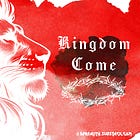

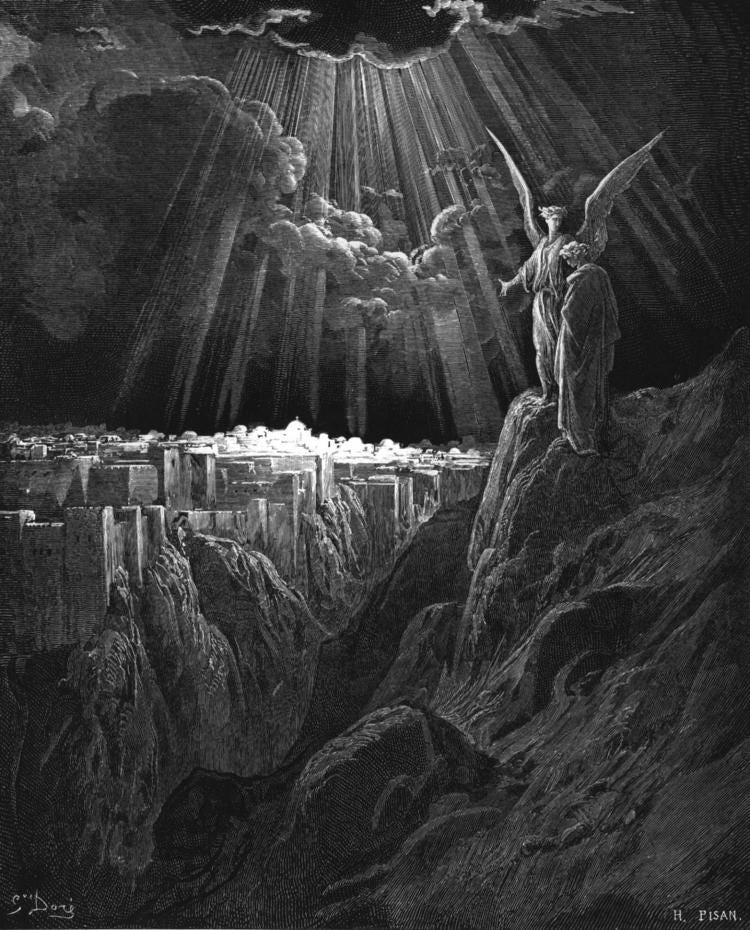
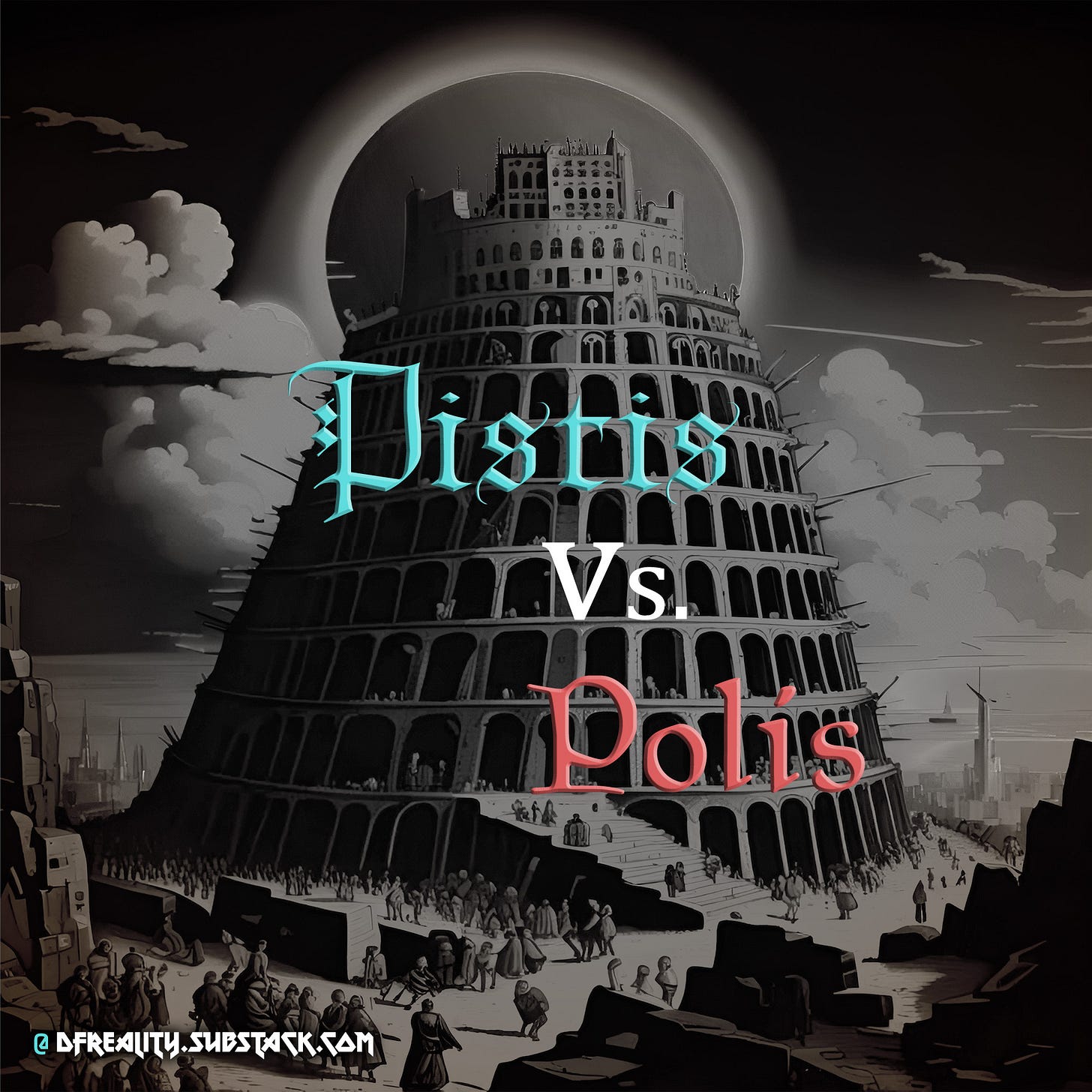
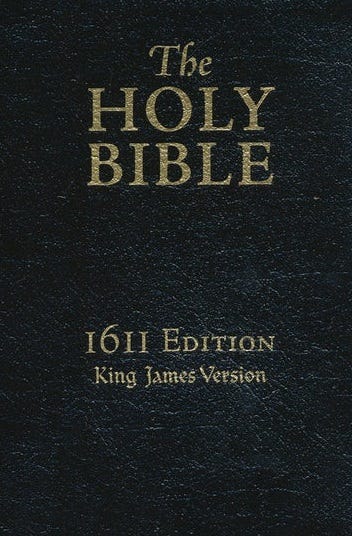
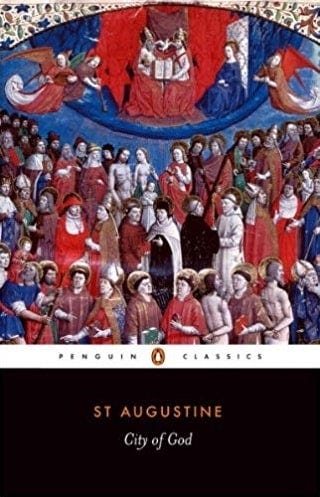
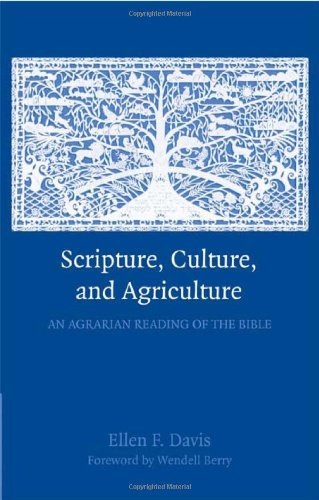
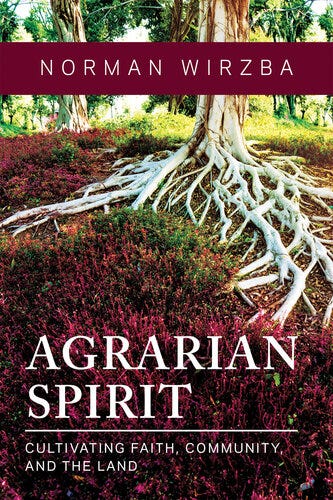
Great reminder to seek the Old Paths. Rebellion to Tyranny is obeyance to God.
Peaceful noncompliance and exiting their system is one way.
Well said. Back to planting my tomatoes...